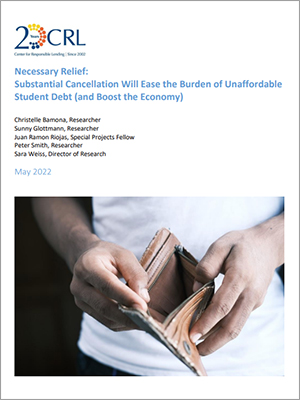Please read our latest newsletter below and explore the previous issues. If you would like to receive email updates including this newsletter and other announcements from the Faith & Credit Roundtable, please email Tamika McGhee.
Faith Leader Spotlight: Stephen Reeves
 Stephen Reeves serves as the co-chair of the Faith & Credit Roundtable, working to reform predatory lending practices. Reeves encourages clergy to speak out against predatory lending because of the ways that it impacts faith communities. “The effort to reform predatory lending has a remarkable ability to bring a diverse group together, including folks who may not agree on much else and offers a powerful opportunity to work across racial lines to address injustice,” Reeves said. In addition to his role as Faith & Credit co-chair, Reeves serves as Director of Advocacy at the Cooperative Baptist Fellowship, and leads Fellowship Southwest, an ecumenical CBF partner organization serving churches and meeting needs in the Southwest United States.
Stephen Reeves serves as the co-chair of the Faith & Credit Roundtable, working to reform predatory lending practices. Reeves encourages clergy to speak out against predatory lending because of the ways that it impacts faith communities. “The effort to reform predatory lending has a remarkable ability to bring a diverse group together, including folks who may not agree on much else and offers a powerful opportunity to work across racial lines to address injustice,” Reeves said. In addition to his role as Faith & Credit co-chair, Reeves serves as Director of Advocacy at the Cooperative Baptist Fellowship, and leads Fellowship Southwest, an ecumenical CBF partner organization serving churches and meeting needs in the Southwest United States.
Upcoming Events
We are looking to feature upcoming events such as conferences, webinars, and prayer walks that are open to our partners. Please email Tamika McGhee if you have an upcoming event that you would like to be featured in this section on a future edition of the newsletter. Thank you!
Bible Verse of the Month
“Whoever is kind to the poor lends to the LORD, and God will reward them for what they have done”
Proverbs 19:17
Louisiana Governor Vetoes Bill Seeking to Expand High-Cost Lending
What happened?
In May 2022, the Louisiana House and Senate each passed SB 381, a bill backed by the payday industry that would have enabled more high-cost loans in Louisiana. On May 31, 2022, Governor John Bel Edwards vetoed SB 381, saying “while I would be willing to support, and sign into law, a bill that reforms payday loans in a manner that provides appropriate safeguards on interest rates and fees, this bill unfortunately does not meet that standard.”
Why would SB 381 have been bad for consumers?
Payday lenders in Louisiana drain more than $145 million in fees because of triple digit interest rates. These loans are currently capped at $350. Misleadingly titled “Louisiana Credit Access Loan Act,” SB 381 would have allowed loans up to $1,500. These loans would have carried triple digit interest rates. Nearly 70% of Louisianians support a 36% interest cap on payday lenders—SB 381 threatened to move the market in the opposite direction. The current debt trap in Louisiana is well documented: data shows that 4 in 5 payday loans in Louisiana are made to borrowers the same day they paid back their previous loans. If Gov. Edwards signed SB 381 into law, payday lenders would have likely used it as sample legislation to pursue similar payday expansion bills in states across the country.
Who fought SB 381?
The Center for Responsible Lending, the Louisiana Budget Project, and other grassroots organizations worked to stop the passage of this bill. During the committee hearing, Rev. Alexis Anderson, an ordained African Methodist Episcopal minister and prison reformist, courageously testified against SB 381. Speaking to a House committee, Rev. Anderson said, “I would ask the committee to not vote for this bill, but also for us to think differently about how we move people into mainstream banking opportunities as opposed to continuously sidelining them into a system that continually eats at their assets.”
New CRL Report - Necessary Relief: Substantial Cancellation Will Ease the Burden of Unaffordable Student Debt
 Various proposals have called for debt relief ranging from $10,000 to $50,000 per borrower. This new report from CRL analyzes the impact of such cancellation, adding analyses from two new data sources: a panel of credit records for more than 360,000 student borrowers and focus group analysis and new analyses from the 2019 Survey of Consumer Finances (SCF). The findings confirm that: Millions of families – despite diligently repaying their debts for a decade or more – remain trapped in unaffordable and growing debt balances. When the temporary relief of the latest student loan payment pause ends, up to 15 million borrowers are projected to experience tremendous hardship.
Various proposals have called for debt relief ranging from $10,000 to $50,000 per borrower. This new report from CRL analyzes the impact of such cancellation, adding analyses from two new data sources: a panel of credit records for more than 360,000 student borrowers and focus group analysis and new analyses from the 2019 Survey of Consumer Finances (SCF). The findings confirm that: Millions of families – despite diligently repaying their debts for a decade or more – remain trapped in unaffordable and growing debt balances. When the temporary relief of the latest student loan payment pause ends, up to 15 million borrowers are projected to experience tremendous hardship.
Cancelling $50,000 of student debt would deliver meaningful relief to a substantial number of borrowers caught in the student debt trap, eliminating debt for 72% of Black and Latino taxpayers and relieving a major source of racial wealth inequity. Read the report.
Oportun Story Collecting Initiative
Oportun is a non-bank lender who has engaged in disturbing debt collection practices aimed at Latinos and immigrants. During the pandemic, Oportun sued low-income Latino borrowers. Oportun promised to reform its practices after CRL and a coalition of groups successfully defeated Oportun’s bid for a national bank charter.
CRL is currently looking for stories from people who borrowed from Oportun in 2021 or 2022 and were sued or faced difficulty refinancing a consumer loan.
Oportun currently operates in Arizona, California, Florida, Idaho, Illinois, Missouri, New Jersey, New Mexico, Nevada, Texas, Utah, and Wisconsin. If you live in one of these states, please consider sharing one of these flyers in English or Spanish with your community, and notify CRL if you hear about harsh debt collection practices by Oportun or any other lender. The flyers can be downloaded and then edited to include your contact information. Thank you for your assistance.